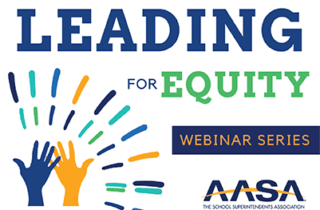Presented by Dr. Barbara Nemko, Superintendent, Napa County Office of Education (CA); Olivia Martinez, English Language Development & Biliteracy Director, Pharr-San Juan-Alamo ISD (TX); Jennifer Jelavich, Colusa County District Administrator, Colusa County Office of Education (CA); and Pinky Jelavich, Jennifer’s Assistant, Colusa County Office of Education (CA)
Moderated by Ilene Rosenthal, CEO, Footsteps2Brilliance
Presented by Dr. Flavia E. Iuspa, Assistant Teaching Professor, School of Education and Human Development, Florida International University; Dr. Elizabeth Cramer, Professor and Graduate Program Director, School of Education and Human Development, Florida International University; and Dr. Maria Tsalikis, Associate Teaching Professor, School of Education and Human Development, Florida International University
As schools reckon with learning equity, they’re often focused on academic progress. During the edWebinar, “Leading for Equity: Academic Development Through an Equity Lens,” hosted by AASA, The Superintendents Association and AASA’s Leadership Network, the presenters talked about the important role social-emotional learning (SEL) plays in the process. In fact, they argued that schools must connect academic equity with SEL if they’re going to reach their goal of serving all students.
Presented by Geoffrey Canada, President, Harlem Children’s Zone®
Moderated by Ray Paul Biron, NexGen Education
Even before the COVID-19 pandemic led to changes in the traditional education model, there was widespread recognition that schools alone could not do everything needed to provide an equitable education for diverse students because so many factors that determine students’ success were being affected or determined outside of school.
With so many issues for school and district leaders to deal with during this difficult time, staying focused on students’ learning experiences may not always seem like the top priority. But district officials from Alabama and Minnesota, who are determined to provide an equitable education for all their students, recently explained how listening to students and taking action based on student input is a key factor in achieving successful outcomes.
Presented by Terrie Noland, CALP, Doctoral Candidate, Ph.D. in Literacy
These and other important lessons from Oregon’s Gresham-Barlow School District were discussed during a recent edWebinar, hosted by AASA, The Superintendents Association and AASA’s Leadership Network, with the district’s Superintendent, Dr. Katrise Perera, and Assistant Superintendent of Curriculum, Instruction, and Assessment, Lisa Riggs. Gresham-Barlow’s school leaders explained how they have been able to increase and sustain engagement in district activities, and how this has led to improved outcomes for the students.
Large school districts in different parts of the United States have now developed systematic ways to increase diverse students’ access to advanced courses, and the districts are also providing other important aspects of an equitable education that prepares the students for 21st century careers.
While gaps in technology access were highlighted during the pandemic, many school and district leaders are trying to make strides with an even older issue: educational equity for children of all races and economic backgrounds. In the edWebinar, “Leading for Equity: Pursuing an Equity Agenda,” hosted by AASA, The Superintendents Association and AASA’s Leadership Network, Dr. Frank Barnes, Chief Equity and Accountability Officer, Charlotte-Mecklenburg Schools (CMS), and Kimberly Vaught, Principal, Allenbrook Elementary School, discussed their approach to building equity.






